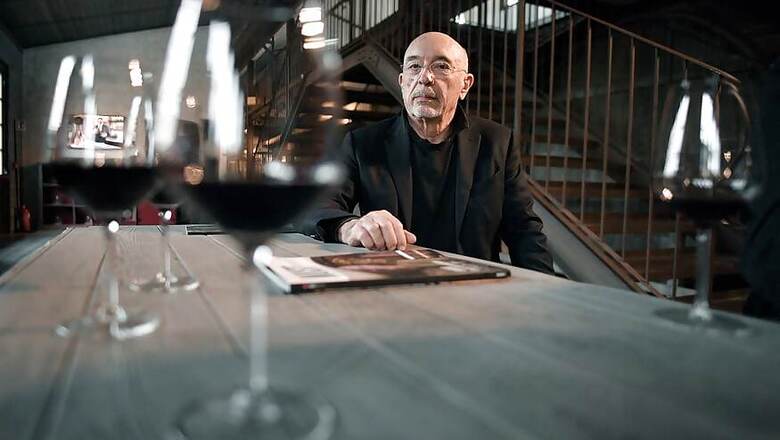
views
Eating lunch in Italy's Bolgheri wine country, it is not hard to understand why the number of international visitors to this bucolic corner of Tuscany has doubled in five years. "People have always come in the summer for the beaches," says Riccardo Binda, cutting into a succulent slice of Florentine steak, grilled over embers. "Now we're getting visitors all year round. It's something new that has developed as the reputation of Bolgheri's wine has grown."
Binda is the general manager of the local consortium of winemakers in an area known for its production of high-quality Bordeaux-style reds. Sourced from eighth generation master butcher Dario Cecchini and hung for 100 days, the T-bone he is eating is a popular choice.
On a sunny October afternoon, the Osteria Magona is packed and abuzz with the mingling murmurs of quiet foodie contentment and wine-fueled chat in English, French, German and Japanese. It's a scene to gladden the heart of Dario Franceschini, Italy's culture and tourism minister, as he prepares the accounts on what is expected to be a record year for tourism. The sector accounts for around 10 percent of the country's GDP and has become a significant engine of growth for an economy emerging from years of stagnation. A bumper summer season saw a 16 percent surge in the total number of visits to the country's long coastlines, with the number of overseas customers up a little more than five percent.
But with just over 52 million foreign visitors in 2016, according to the UN's World Tourism Organization, Italy still lags behind its comparable neighbors France, with 82 million visitors last year, and Spain with 75 million. The minister is also acutely aware that much of the recent growth in tourism can be attributed to terrorism-related security concerns that have diverted holidaymakers from Tunisia, Egypt and Turkey. Against that backdrop, authorities are looking to bolster year-round arrivals and target visitors in search of more than a sun tan.
Foreign directors have been brought in to revamp some of the country's major museums and art galleries, while a major upgrade of the Francigena pilgrim's route reflects an effort to draw in more hikers and cyclists. But according to designer and entrepreneur Franco Malenotti, the country is not making the most of its celebrated wines and rich culinary heritage.
"Enogastronomic (food and wine) tourism is a big new trend," Malenotti told AFP, citing research that points to a major surge in Asian and Latin American foodies heading for Europe in the next few years. "Italy should be in the avant garde in this sector. But it's not. Why? Because we have done almost nothing to foster and promote it."
Malenotti's eclectic career has included designing Batman and other Hollywood costumes as well as owning the cult fashion label Belstaff. His latest venture is a 'World Wine Town', an accommodation and restaurant complex constructed around a recently opened museum dedicated to the story of Bolgheri's wines and designed by Oscar-winning cinema set designer Dante Ferretti.
With more than 1,000 wines on tap, Malenotti is banking on the complex drawing in people like German couple Susann and Rainer Schmidt. "You want to taste and try the wines, but also to learn something," says Susann, glass in hand after a stroll round an exhibition in which holograms of famous winemakers such as Piero Antinori and Nicolo Incisa della Rocchetta recount their roles in making Bolgheri's reputation. Malenotti was inspired by the example of Bordeaux's Cite du Vin. "Whatever product you are selling, you need a back story. It is called storytelling and it is very important in marketing," he said, adding, "After coming here the majority of tourists go on to visit the wineries. In places like the Napa Valley (in the US), estates get more than half their sales from the cellar door, here in Bolgheri it is only five percent. That shows how much there is still to do."
As well as keeping restaurateurs busy, booming wine tourism has also impacted the local economy by creating a new demand for accommodation that the traditional hotel sector has yet to meet.
In Castagneto, the village closest to the museum, Malenotti estimates that three quarters of the properties are partly or fully available to rent on Airbnb-style platforms. "It is a very disruptive trend, but not necessarily a bad one: the people really live in the area, buy stuff at the shop downstairs, eat out. And already there are service companies springing up offering to do the check-ins and check-outs, the cleaning and the laundry for these kind of rental," hes says.
The wine town project will be completed over the next year with the opening of a school for sommeliers.
"I worked with Dante on many Hollywood films and I'd also seen the great success he had with his redesign of the Egyptian museum in Turin, which has doubled its visitor numbers and is now one of the most visited museums in all of Italy," said Malenotti, adding, "It is what people are looking for. Once vacations were about going to a disco, relaxing, having fun. Now culture and well-being are the things driving today's tourism. So Italy should really be leading the world."



















Comments
0 comment